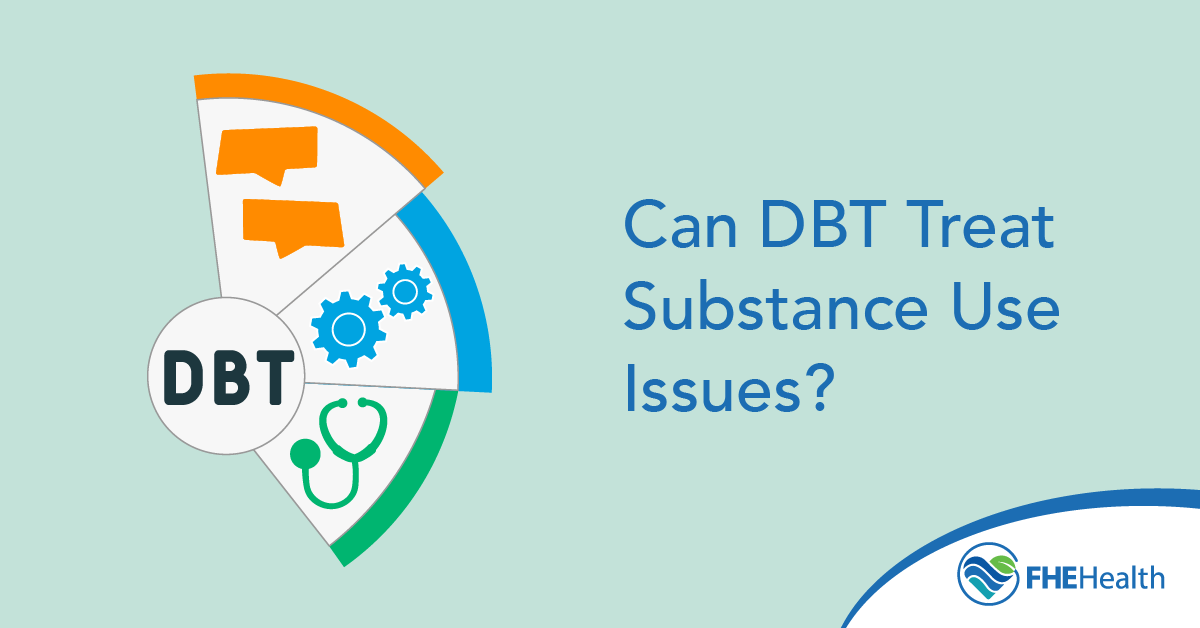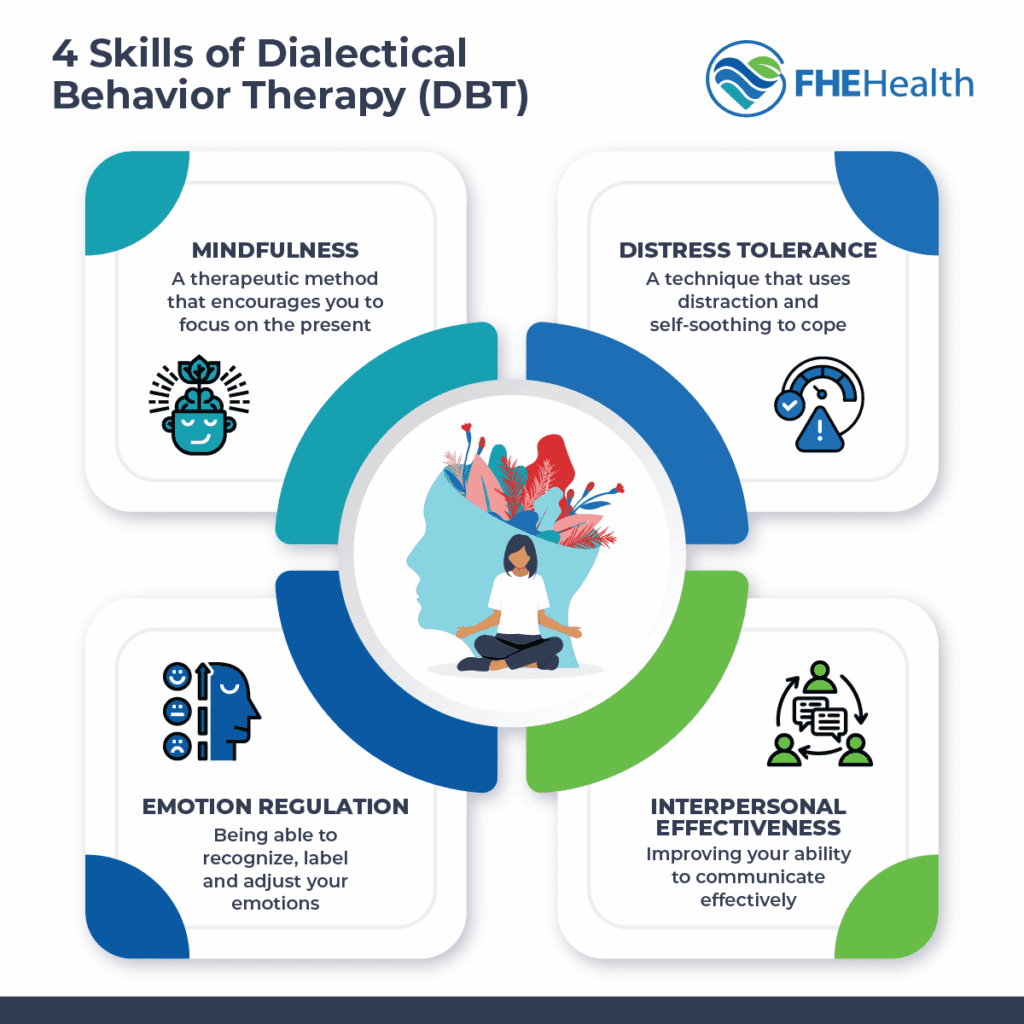
For those struggling with addiction, there isn’t a one-size-fits-all treatment program. What works for some might not work for others. However, one treatment option that’s gaining recognition as being extremely helpful for many individuals recovering from alcohol and drug abuse is dialectical behavior therapy. DBT treatment for addiction was originally developed to treat individuals with borderline personality disorder. It’s also beneficial for people dealing with self-harm behaviors and other mental health conditions. This article explores what DBT is, how it’s used, what it’s used for and how to find a reputable program.
What Is DBT Treatment for Addiction?
DBT treatment for substance abuse is a type of talk therapy that focuses on individual acceptance and working to solve negative behaviors. It’s based on four core ideas that teach positive life skills:
- Mindfulness. Mindfulness teaches you to be fully aware of your thoughts, feelings and surroundings and to be present in the moment. It helps you observe your experiences rather than feeling overwhelmed by them.
- Distress tolerance. Distress tolerance teaches you how to navigate difficult situations without exacerbating them through impulsive actions.
- Emotional regulation. Using emotional regulation, you learn to identify your feelings and what triggers certain emotions. It also helps you develop strategies to influence a calm and stable response.
- Interpersonal effectiveness. This skill helps you communicate your needs, set boundaries and maintain healthy relationships.
How DBT Addresses Emotional Regulation and Impulse Control
One reason many people turn to drugs and alcohol is to manage strong emotions during times of stress, especially when they feel they’re about to lose control. This is referred to as emotional dysregulation. DBT and substance use treatment work together to address these underlying issues.
Using DBT, you learn to recognize emotional triggers and deal with them as they happen. Instead of immediately turning to substance use, you implement skills including radical acceptance, distraction techniques and self-soothing.

Why DBT Can Be Effective for Co-Occurring Disorders
Approximately 8% of adults in the United States live with addiction and mental illness. Both conditions must be treated simultaneously to achieve a successful recovery. Traditional inpatient and outpatient programs focus primarily on treating addiction. Because DBT was originally used to treat borderline personality disorder — a condition that often occurs with substance use disorders — it’s also helpful in treating other interacting mental health conditions.
DBT offers a more comprehensive approach by addressing how addiction and mental illness often go together. It’s most useful for individuals who experience the following symptoms:
- Thoughts of self-harm
- Emotional outbursts
- Damaged relationships
- Feelings of isolation and emptiness
- Fear of abandonment
Evidence Supporting DBT for Substance Use Treatment
Multiple studies have demonstrated the effectiveness of DBT for substance use treatment. Research indicates that DBT increases treatment success and can improve the overall quality of life for those in recovery. It’s often recommended to those who’ve experienced multiple failed treatment attempts with traditional methods.
Kermanshah University of Medical Sciences studied 61 individuals with marijuana use disorder. Patients were either assigned to a control group or a DBT group. After 2 months, the DBT group reported a significant decrease in cravings compared to the control group. The results indicated that DBT is an effective treatment method for addictive behaviors.
In randomized controlled trials, DBT showed the most success in treating borderline personality disorders combined with addiction, especially opioid addiction. Individuals receive training in regulating their emotions, tolerating stress, receiving help from others and using mindfulness. Those who received the training were better prepared to address addictive behaviors than those who didn’t. The study demonstrated how coping skills can replace negative behaviors and deliver a more successful treatment outcome.
In another study, 29 individuals struggling with substance abuse were admitted to the San Raffaele Hospital in Milan to participate in a DBT study program. The study measured symptoms of substance abuse before and after treatment. The results indicated significant improvements in emotional reactions in those who completed the program.
Additional research by DBT therapists provided more evidence that DBT skills helped patients break the cycle of addiction and improved their overall quality of life.
How DBT Fits Into a Comprehensive Recovery Plan
While DBT is a powerful treatment option for those with a substance abuse disorder, it’s most effective as part of a comprehensive program. DBT treatment typically lasts longer than some other therapies, with the average regimen taking around 24 weeks. The longer timeline allows for skill development and practice.
A complete DBT program usually includes these additional evidence-based treatments:
- Medical detox. Supports an individual as they adjust to eliminating drugs and alcohol from their system
- Medication-assisted treatment. Used to treat many types of substance use disorders
- Individual therapy. Focuses on individual challenges and goals
- Group therapy. Helps the patient learn and practice coping strategies with others
- Family therapy. Helps individuals repair broken relationships
- Follow-up and aftercare. Use support groups, such as 12-step groups, to help individuals maintain sobriety during the recovery stage of treatment
Finding a DBT Program for Addiction
Finding the right program that fits your individual needs is important for success. With so many options to choose from, choosing the best one can be difficult. There are multiple ways to find qualified programs and providers. First, look for therapists specifically trained in DBT treatment for addiction. You can usually find this information on individual websites and professional directories. Most treatment centers also provide DBT and substance abuse treatment programs. You can also check with community health centers or your family doctor for recommendations.
Ask questions about the program’s approach and success rates. A single treatment doesn’t work the same for everyone. Find out how the program creates custom therapies for everyone.
Getting Help for Addiction
If you or someone you love struggles with addiction and you’re looking for a comprehensive treatment program that includes DBT, choose our personalized approach. Contact FHE Health to find out more about your options and learn how you can get started.






